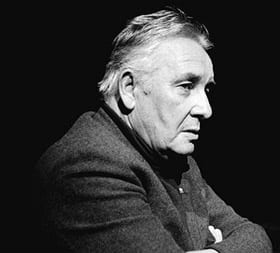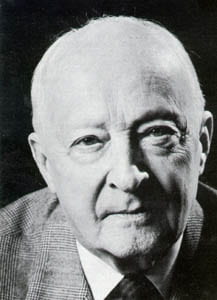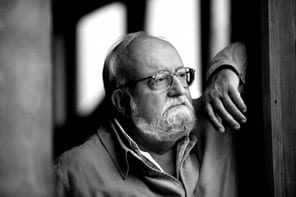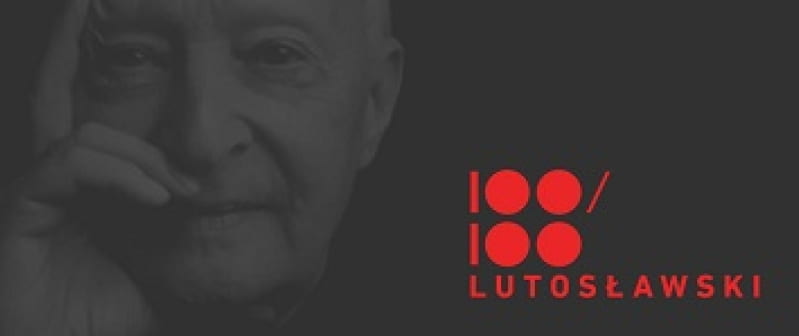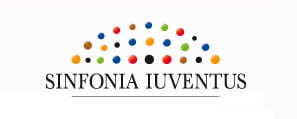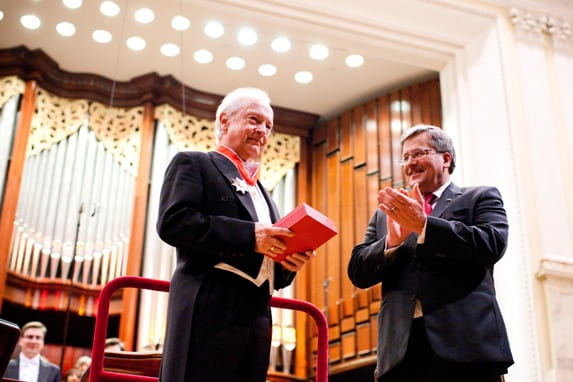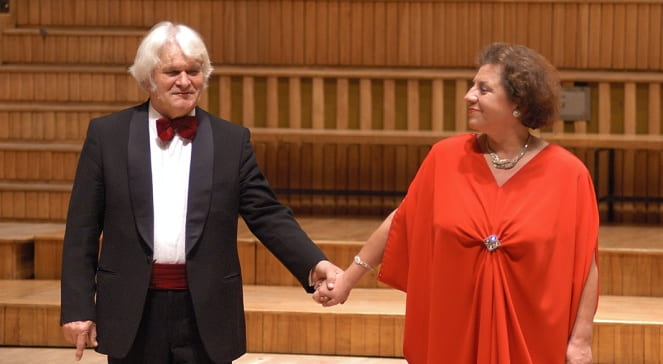Polish Music Newsletter Vol. 19, no. 3
Lutosławski Year 2013
Lutosławski Concerto Wins Competition For Rosselet
 The Thornton School of Music at the University of Southern California holds an annual Concerto Competition, to celebrate the fine soloists who are a part of the student body. Amongst the winners of the 2012 Competition is cellist Frédéric-Olivier Rosselet, who won for his performance of W. Lutosławski’s Cello Concerto. He and other Competition winners will be featured during a concert performed by the USC Symphony with Principal Conductor Carl St. Clair on March 14 in USC’s Bovard Auditorium.
The Thornton School of Music at the University of Southern California holds an annual Concerto Competition, to celebrate the fine soloists who are a part of the student body. Amongst the winners of the 2012 Competition is cellist Frédéric-Olivier Rosselet, who won for his performance of W. Lutosławski’s Cello Concerto. He and other Competition winners will be featured during a concert performed by the USC Symphony with Principal Conductor Carl St. Clair on March 14 in USC’s Bovard Auditorium.
Performers in USC’s Concerto Night will also include clarinetist Joseph Morris in Nielsen’s Clarinet Concerto op. 57 and pianist Fang-Fang Shi in Beethoven’s Piano Concerto No. 1 op. 15.
Thursday, March 14, 2013 | 7:30pm
Concerto Night with Frédéric-Olivier Rosselet and the USC Symphony
Bovard Auditorium, University of Southern California, Los Angeles
Admission: Free
More info: usc.edu
[Sources: facebook.com, usc.edu]
Anniversaries Celebrated In Beethoven Magazine
The latest issue of Beethoven Magazine (No. 17) is devoted to the big three of Polish 20th-century composers, whose anniversaries are celebrated this year: Witold Lutosławski, Krzysztof Penderecki, and Henryk Mikołaj Górecki. The magazine is edited by Anna S. Dębowska, and the graphic layout is designed by Witold Siemaszkiewicz.
The work of these composers is discussed in the issue by musicologist Iwona Lindstedt, who also interviewed Krzysztof Penderecki about his music, including his latest works such as Missa brevis, Double Concerto for Violin and Viola, Duo Concertante and the new version of the opera The Devils of Loudun. Anna S. Dębowska writes about the celebrations of the Lutosławski Year in Warsaw (Anne-Sophie Mutter’s concert) and London (Krystian Zimerman’s concert), while in her essay Ewa Szczecińska attempts to answer why Witold Lutosławski did not write an opera, despite the fact that theatricality was so significant in his instrumental oeuvre.
The current issue of the magazine is complemented by an important topic of the relay of generations, namely the debuts of a new generation of artists born in the 1980s and 1990s. Grzegorz Dąbrowski talks to 24-year-old Magdalena Bojanowicz (cello) and Maciej Frąckiewicz (accordion), winners of this year’s Polityka Passports. Tomasz Handzlik interviews jazz pianist Piotr Orzechowski (“Pianohooligan”), the author of an interesting record experiment transcribing some of Krzysztof Penderecki’s instrumental works to the piano.
 In the third part of the series “Virgins, Scatterbrains, Vamps and Queens,” Piotr Deptuch depicts the profiles of the operatic femme fatale. On the bicentenary of Verdi’s and Wagner’s birthdays, he also writes about what the two composers have in common and what makes them different. Jacek Marczyński makes a ranking of the most frequently staged 20th-century operas. The Deutsche Grammophon album series for beginners and advanced music lovers is discussed by Maciej Ł. Gołębiowski. Adam Suprynowicz recommends new recordings of the Belcea Quartet (Beethoven) and Marc Minkowski (Schubert’s symphonies), and Paweł Szczepanik a new biography of Igor Stravinsky.
In the third part of the series “Virgins, Scatterbrains, Vamps and Queens,” Piotr Deptuch depicts the profiles of the operatic femme fatale. On the bicentenary of Verdi’s and Wagner’s birthdays, he also writes about what the two composers have in common and what makes them different. Jacek Marczyński makes a ranking of the most frequently staged 20th-century operas. The Deutsche Grammophon album series for beginners and advanced music lovers is discussed by Maciej Ł. Gołębiowski. Adam Suprynowicz recommends new recordings of the Belcea Quartet (Beethoven) and Marc Minkowski (Schubert’s symphonies), and Paweł Szczepanik a new biography of Igor Stravinsky.
In addition, the most important events in contemporary art are recommended by Dorota Jarecka from Gazeta Wyborcza, who indicates the venues worth visiting this year. Also, Anna Cymer writes about music buildings: this installment discusses Harpa in Reykjavik, a concert and opera hall that looks as if built from ice and light.
[Source: beethoven.org.pl]
Lutosławski in MWM
The Witold Lutosławski Year was celebrated by Muzyka w mieście [Music in the City]—a magazine published by the Wrocław Philharmonic—with a special January-February issue devoted mainly to the oeuvre and life of Lutosławski, the most outstanding Polish composer after Chopin. Anne Sophie-Mutter, Heinz Holliger, David Harrington from Kronos Quartet, Esa Pekka-Salonen, Solveig Kringelborn, and Kazimierz Kord talk about the man and his music. Paweł Hendrich explains why Lutosławski’s chords sound like leaves in the wind, Adam Sławiński recalls his decades-long friendship with the composer, and Adrian Thomas reveals the secret of Lutosławski’s L-shaped carpet covering the floor of his study. There will be more articles devoted to Lutosławski this year, including the memories of Ewa Pobłocka and Krzysztof Meyer.
[Source: polmic.pl]
New Polish Radio CD – In Memoriam
 Witold Lutosławski – In memoriam
Witold Lutosławski – In memoriam
Krzysztof Penderecki: “Adagietto” from Paradise Lost and Stabat Mater; Witold Lutosławski: Funeral Music; Karol Szymanowski: Stabat Mater
Bożena Harasimowicz – soprano, Ewa Marciniec – mezzo-soprano, Wojciech Drabowicz – baritone, National Polish Radio Symphony Orchestra (NOSPR), Polish Radio Choir, Choir of the Kraków Philharmonic, Krzysztof Penderecki – cond.
PRCD 1592
[Sources: polmic.pl, sklep.polskieradio.pl]
Lutosławski Conference
“Lutosławski and the interior drama: the spaces of dream” will be a day of talks and music as part of the Philharmonia Orchestra’s Woven Words series celebrating the centenary of Lutosławski’s birth. Steven Stucky, Series Advisor, will be joined by other leading musicologists and specialists in the life and music of Witold Lutosławski.
10.00 Arrival and coffee
10.30 Glimpsing an ideal world – Steven Stucky, ‘Woven Words’ Series Consultant
11.15 The spaces of dream: Lutosławski and surrealism – Adrian Thomas, Emeritus Professor, Cardiff University
12.00 Lunch break
1.30 Individual utterance and collective emotion: constructing the Lutosławski String Quartet – Jubilee String Quartet and Steven Stucky
2.45 The sense of an ending: late music, enduring concerns – Nicholas Reyland, Senior Lecturer, Keele University
3.45 Panel discussion – Steven Stucky with Nicholas Reyland and Adrian Thomas
March 16, 2013 | All-day
Lutosławski and the interior drama: the spaces of dream
Philharmonia Orchestra Study Day
St Paul’s Roof Pavilion, Royal Festival Hall, London
Tickets: southbankcentre.co.uk
[Sources: woven-words.co.uk, southbankcentre.co.uk]
Woven Words Concert Series Concludes In London
Royal College of Music performs Duos and Fanfares
 As a part of the Royal College of Music Chamber Series and the Woven Words Series, performers from the Royal College of Music will perform an all- Lutosławski program, including: Mini Overture for Brass Quintet, Fanfare for CUBE for Brass Quintet and Percussion, Partita for Violin and Piano, Epitaph for Oboe and Piano, Subito for Violin and Piano, Grave (from Metamorphoses) for cello and piano, Dance Preludes for Clarinet in B flat and Piano. Held at the RCM Recital Hall on March 6, 2013, the concert will feature the following ensembles: Sam Kinrade, Catherine Knight, Daniel Curzon, Thomas Barton, Stephen Calow – brass quintet; Michael Foyle, Maksim Shtshura – violin & piano; Katie Potts, Melis Omeroglu – oboe & piano; Olesya Sablina, Maria Setiadi – cello & piano; Benjamin Mellefont, Clara Murnig – clarinet & piano.
As a part of the Royal College of Music Chamber Series and the Woven Words Series, performers from the Royal College of Music will perform an all- Lutosławski program, including: Mini Overture for Brass Quintet, Fanfare for CUBE for Brass Quintet and Percussion, Partita for Violin and Piano, Epitaph for Oboe and Piano, Subito for Violin and Piano, Grave (from Metamorphoses) for cello and piano, Dance Preludes for Clarinet in B flat and Piano. Held at the RCM Recital Hall on March 6, 2013, the concert will feature the following ensembles: Sam Kinrade, Catherine Knight, Daniel Curzon, Thomas Barton, Stephen Calow – brass quintet; Michael Foyle, Maksim Shtshura – violin & piano; Katie Potts, Melis Omeroglu – oboe & piano; Olesya Sablina, Maria Setiadi – cello & piano; Benjamin Mellefont, Clara Murnig – clarinet & piano.
March 6, 2013 | 6:00pm
Woven Words: Duos and Fanfares
Recital Hall, Royal College of Music, London
Admission: Free but tickets required
Box Office: 020 7591 4314
Info: www.rcm.ac.uk
Philharmonia Orchestra & Kwartludium
 Continuing the Philharmonia Orchestra’s Lutosławski anniversary celebrations, on March 7 Esa-Pekka Salonen conducts the Concerto for Orchestra and Cello Concerto alongside Debussy’s La Mer. The concert will feature Norwegian cellist Truls Mørk.
Continuing the Philharmonia Orchestra’s Lutosławski anniversary celebrations, on March 7 Esa-Pekka Salonen conducts the Concerto for Orchestra and Cello Concerto alongside Debussy’s La Mer. The concert will feature Norwegian cellist Truls Mørk.
Held in Royal Festival Hall, this program contains two of Lutosławski’s major works of crucial importance. The virtuoso fast-reflexes of the Concerto for Orchestra form a blazing climax to Lutosławski’s early period and mark a new fascination with Bartók and the musical potential of indigenous folksong, while the glorious Cello Concerto (1970), commissioned originally by the Royal Philharmonic Society which is celebrating its 200th anniversary this year, was composed during a time of great political unrest in Poland.
Throughout this series the music of Lutosławski is paired with that of Debussy and Ravel, both composers whom meant so much to Lutosławski; and whose delight in color inspired him throughout his life. Debussy’s principal aim in La Mer was ‘to create a mysterious harmony between nature and the imagination’; something that clearly had a vital impact on Lutosławski’s own creative thinking.
That same night, Royal Festival Hall will host Polish chamber ensemble Kwartludium in a free pre-concert performance at 6pm. Kwartludium will perform music by contemporary Polish composers including Wojciech Blecharz and Jagoda Szmytka, arranged in liaison with the Mickiewicz Foundation.
March 7, 2013 | 6:00pm
Kwartludium performs contemporary Polish composers
Royal Festival Hall, London
Admission: FREE
March 7, 2013 | 7:30pm
Philharmonia Orchestra performs Lutosławski
Tickets: www.southbankcentre.co.uk
Philharmonia Orchestra, Cellonet/Cellotronicum & El Derwid-Sunspots
On March 21, Esa-Pekka Salonen conducts the final concert in the London series, which this time pairs Lutosławski’s Symphony No.4 with works by Ravel. The concert features soloists Jennifer Koh – violin and Matthias Goerne – baritone.
The meticulously fashioned soundscapes of Ravel’s suite Ma mère l’oye [Mother Goose] and his La valse form the perfect musical backdrop to this final tribute to Lutosławski in the composer’s centenary year. Les espaces du sommeil [The Spaces of Sleep] is a mesmerizing setting of a poem by French surrealist Robert Desnos in which Lutosławski imaged ‘the singer is telling us about his dreams’, while Chain 2 continues to explore the element of ‘chance’ that had been an important part of Lutosławski’s music since the 1960s. Esa-Pekka Salonen conducted the première recording of the Fourth Symphony, the crowning achievement of the composer’s distinguished career, just three months before he passed away.
A free pre-concert recital by two Polish avant-garde groups: Cellonet – eight eminent Polish cellists who combine art with virtuosity and Cellotronicum – an innovative project for solo cellist, Andrzej Bauer, and electronics. Arranged in liaison with the Adam Mickiewicz Institute.
 The Clore Ballroom at Royal Festival Hall will also host a special late-night, post-concert free event featuring contemporary Polish music group El Derwid-Sunspots. Using voice, cello, piano and computers, Andrzej Bauer (cello), Agata Zubel (voice) and Cezary Duchnowski (computer, piano) will interpret contemporary Polish songs and music influenced by Lutosławski and his contemporaries.
The Clore Ballroom at Royal Festival Hall will also host a special late-night, post-concert free event featuring contemporary Polish music group El Derwid-Sunspots. Using voice, cello, piano and computers, Andrzej Bauer (cello), Agata Zubel (voice) and Cezary Duchnowski (computer, piano) will interpret contemporary Polish songs and music influenced by Lutosławski and his contemporaries.
March 21, 2013 | 6:00 pm
Cellonet/Cellotronicum pre-concert
Royal Festival Hall, London
Admission: FREE
March 21, 2013 | 7:30pm
Philharmonia Orchestra with Jennifer Koh and Matthias Goerne
Royal Festival Hall, London
Tickets: southbankcentre.co.uk
March 21, 2013 | late night
El Derwid-Sunspots post-concert
Royal Festival Hall, London
Admission: FREE
[Sources: woven-words.co.uk, polishculture.org.uk]
Philharmonia On Tour
In between concerts in London, Esa-Pekka Salonen and the Philharmonia Orchestra with take their program to Warsaw and to three different cities in Italy. The programs in each venue will differ slightly, but each will include some combination of music by Lutosławski, Ravel and Debussy.
March 13, 2013 | 7:00pm
London Philharmonia, Esa-Pekka Salonen and Truls Mørk – cello
Warsaw Philharmonic Concert Hall, Warsaw, Poland
Info & Tickets: www.filharmonia.pl
March 16, 2013 | 9:00pm
London Philharmonia, Esa-Pekka Salonen
Teatro Comunale Luciano Pavarotti, Modena, Italy
Info & Tickets: www.teatrocomunalemodena.it
March 17, 2013 | 8:45pm
London Philharmonia, Esa-Pekka Salonen
Teatro Nuovo Giovanni da Udine, Udine, Italy
Info & Tickets: www.teatroudine.it
March 18, 2013 | 8:00pm
London Philharmonia, Esa-Pekka Salonen
Teatro dell’Opera, Rome
Info & Tickets: www.operaroma.it
MORE NEWS: See the Awards section for the winners of the 2013 Lutosławski Cello Competition!
PMC News
Sounds From Behind The Iron Curtain: PMC Conference, Concert & Manuscript Exhibit
April 6, 2013 – USC, Los Angeles
The Polish Music Center (PMC) at USC’s Thornton School of Music in Los Angeles is pleased to present “Sounds from Behind the Iron Curtain: Polish Music after World War II”—a day-long event held on April 6, 2013 at the University of Southern California in Los Angeles. It will include a Musicology and Digital Humanities Conference, a piano recital by Leszek Możdżer, and an exhibit of manuscripts by contemporary Polish composers, culled from the Manuscript Collection of the Polish Music Center.
CONFERENCE: 9 a.m.-3 p.m. (Ahmanson Center, Room 236, USC)
The conference “Sounds from Behind the Iron Curtain: Polish Music after World War II” will bring together musicologists and cultural historians in a vivid conversation exploring the development of Polish music since 1945. Presentations will focus on the relation of music to politics, identity, and the reception of Western composers in Poland under Socialist Realism and during the Solidarity era. The conference program will also include film screenings and will be streamed live online for viewers around the world.
For a full description of all presentations, click here.
CONCERT BY LESZEK MOŻDŻER: 4 p.m. (Alfred Newman Recital Hall, USC)
 A piano recital celebrating the centenary of Witold Lutosławski’s birth will feature internationally renowned jazz pianist, Leszek Możdżer. His unique position as a jazz pianist is in part due to his enduring interest in music by a wide spectrum of contemporary Polish composers. They include jazz greats, like Krzysztof Komeda (1931-1969), film music composers like Zbigniew Preisner (b. 1955) or Jan A.P. Kaczmarek (b. 1953), and such towering figures in the history of Polish classical music as Witold Lutosławski (1913-1994).
A piano recital celebrating the centenary of Witold Lutosławski’s birth will feature internationally renowned jazz pianist, Leszek Możdżer. His unique position as a jazz pianist is in part due to his enduring interest in music by a wide spectrum of contemporary Polish composers. They include jazz greats, like Krzysztof Komeda (1931-1969), film music composers like Zbigniew Preisner (b. 1955) or Jan A.P. Kaczmarek (b. 1953), and such towering figures in the history of Polish classical music as Witold Lutosławski (1913-1994).
Leszek Możdżer explores and reinterprets the music of his illustrious predecessors and colleagues using his own unique, pioneering style that fuses classics and jazz and breathes new life into well-known repertoire. Możdżer’s musical genius lies in his uncanny ability to focus on the salient features of a chosen style and invest them with a unique sound identity that melds the jazz and classical avant-garde traditions. Możdżer’s artistry is an interesting reflection of how Polish musicians have reinterpreted a genre that is native to America.
MANUSCRIPT EXHIBIT: 3-6 p.m. (Alfred Newman Recital Hall Vestibule, USC)
Selected manuscripts from the Polish Music Center’s Manuscript Collection will be presented to the public after the conference. The PMC Manuscript Collection was established with an initial donation of five major orchestral works by Witold Lutosławski, personally deposited by the composer in 1985 at the founding of the PMC. The exhibit will include Lutosławski’s manuscripts as well as Krzysztof Meyer’s opera Cyberiada and Krzysztof Penderecki’s String Quartet, and other highlights of contemporary Polish music.
Registration for the conference is $25, and includes entrance to all presentations and film screenings, as well as breakfast and lunch. To register, email polmusic@usc.edu. Admission to the concert and manuscript exhibit is free.
SATURDAY, APRIL 6 | 9:00 a.m. – 6:00 p.m.
Sounds from Behind the Iron Curtain: Polish Music after World War II
University of Southern California – Los Angeles, CA 90089 [Campus map]
Campus parking: $10 [Enter USC Gate #3 at McCarthy Way & Figueroa St., park in PSX]
Conference fee: $25
Concert & Exhibit admission: FREE
For updated information and details, visit: www.usc.edu/dept/polish_music/2013conference.html
Paderewski Weber Moves From Vancouver To Paso Robles
Paderewski always played on Steinway pianos… right? Not quite. For two of his American tours, he actually used a Weber piano. It came about because of Paderewski’s disagreement with Charles Steinway, who refused to accede to Paderewski’s detailed requirements for regulating and preparing Steinway pianos for his tours. As Paderewski recalled in his Memoirs:
The demands I had made for changes in the piano were quite justified and I had every reason for demanding them. True, it involved trouble and expenditure on their part but I, at that time, was playing the Steinway pianos all over the world and asked nothing that was not within reason and my artistic rights. And so our relations were completely broken off. It was a deadlock. I felt they were acting most unfairly to me. I then accepted and used the Weber piano, which belonged at that time to the Aeolian Company. In fact, owing to the Steinway disagreement, I played the Weber piano successfully for two consecutive tours.
It took a very long time to get accustomed to another instrument, to make it my friend and respond to my demands. But I succeeded and my tour went on as usual in spite of this added strain. Fortunately, the Steinway disagreement ended a few years later in perfect harmony and with rejoicing on both sides.
The added bonus of Paderewski’s brief liaison with Weber was meeting of Eldon Joubert, a master piano technician for the Weber Piano Company, who stayed on as Paderewski’s personal tuner for the rest of the great pianist’s career.
About a year ago, Joanna Kozińska-Frybes, Consul General of the Republic of Poland in Los Angeles, called Marek Zebrowski at the PMC to let him know that there is a Weber piano in Vancouver, possibly associated with Paderewski’s performances there. It was housed in the offices of Consulate General of Poland in downtown Vancouver. A few weeks later, in February 2012, Mr. Zebrowski flew to Vancouver to meet with the Consular officials and the Paderewski Heritage Committee, headed by Tamara Szymańska and Irena Gostomska. The piano is a 9-foot grand, with an ornate, Victorian case, and it dates from about the mid-1880s. It has been rebuilt and refinished and is in playable condition.
Mr. Zebrowski will once again travel to Vancouver to lecture on Paderewski and perform on this historic instrument. The invitation-only event at the Polish Consulate is scheduled for March 15. A few weeks later, the Weber piano will travel to Paso Robles on California’s Central Coast where Paderewski owned vineyards and almond groves during the years 1914-1941. The instrument has been generously donated by the Paderewski Heritage Committee in Vancouver to the Paderewski Festival in Paso Robles, an annual event always held in November in commemoration of Paderewski’s birthday.
For more information about the piano’s history in Vancouver, read Cheryl Rossi’s article for the Vancouver Courier.
Paderewski And Steinway In Chicago
The elegant building of the Consulate General of the Republic of Poland in Chicago hosted a special fundraising event for their 1911 Steinway A grand piano. Organized by the Chicago chapter of the Kosciuszko Foundation, the March 1 event drew an elite crowd of Polonia to the Consulate’s formal ground floor ballroom. A brief introduction by Consul General Paulina Kapuścińska was followed by Marek Zebrowski’s lecture about Paderewski, Steinway pianos, and Paderewski’s substantial links to Chicago and its Polish-American community. The musical part of the evening included Paderewski’s best-known piano works performed by Zebrowski and Igor Lipiński, a doctoral student at the Northwestern University. Lipiński also performed a selection of Chopin’s Mazurkas and Zebrowski returned for the final selection of Chopin’s Andante spianato and Grand Polonaise. A standing ovation from the crowd elicited an encore from both artists, who jointly presented the opening dance from Paderewski’s Tatra Album for piano 4-hands.
 A silent auction of books on Paderewski and Chopin, CDs, a selection of premium wines donated by Cass Winery in Paso Robles, CA, and a weekend getaway at the Cass Winery Guest House added to a very successful fundraising evening. A sumptuous buffet followed, with traditional Polish hospitality on display.
A silent auction of books on Paderewski and Chopin, CDs, a selection of premium wines donated by Cass Winery in Paso Robles, CA, and a weekend getaway at the Cass Winery Guest House added to a very successful fundraising evening. A sumptuous buffet followed, with traditional Polish hospitality on display.
On March 2, the Kosciuszko Foundation Chicago Chapter held another fundraiser for the Consulate Steinway at the exclusive home of Dr. Kornelia Krol in Winnetka, Illinois. On this occasion, Mr. Lipiński and Mr. Zebrowski were joined by soprano Brygida Bziukiewicz-Kulig, who—together with Mr. Lipiński—performed selections of songs by Chopin, Moniuszko and Karłowicz. The two pianists once again traded places, performing selections of salon pieces by Paderewski and Chopin, with Mr. Zebrowski’s commentary providing the connective tissue to the music. A silent auction followed the music and then the assembled guests were treated to several courses of traditional Polish supper under the hospitable roof of Dr. Krol.
The latest update of receipts from both fundraising events brought very good news to the organizers and all donors: the goal of collecting the funds for the Consulate Steinway restoration has been reached! The process of replacing the strings, action, soundboard and pinblock, as well as refinishing the case, repairing the pedal lyre, and regulating all the mechanisms will take a few solid months. An inaugural concert for the restored instrument is already being considered. Stay tuned for further details!
[Image source: chicago.msz.gov.pl]
News
Przybylski Premiere
 On March 8, 2013, in the Evangelical Lutheran Church of the Holy Trinity in Warsaw will premiere the latest religious composition of Dariusz Przybylski – Passio et Mors Domini Nostri Iesu Christi Secundum Ioannem (2013) for 12 a cappella voices. The work was commissioned by PHØNIX16—a vocal ensemble from Berlin with which Przybylski is currently serving as Composer in Residence—and funded by the Ernst von Siemens Musikstiftung. The concert program will also include three of the 7 Passion Texts (2006) by Wolfgang Rihm.
On March 8, 2013, in the Evangelical Lutheran Church of the Holy Trinity in Warsaw will premiere the latest religious composition of Dariusz Przybylski – Passio et Mors Domini Nostri Iesu Christi Secundum Ioannem (2013) for 12 a cappella voices. The work was commissioned by PHØNIX16—a vocal ensemble from Berlin with which Przybylski is currently serving as Composer in Residence—and funded by the Ernst von Siemens Musikstiftung. The concert program will also include three of the 7 Passion Texts (2006) by Wolfgang Rihm.
The following day, another performance of Przybylski’s Passion will be held during the inaugural concert of XIII Festiwalu Muzyki Pasyjnej i Paschalnej [Music Festival of Passion and Paschal] in Poznań, in the Cloister of the Discalced Carmelites. It will also be performed on March 17 (St. Ansgar Kirche) and 24 (Katholische Akademie) in Berlin. All concerts will be performed by PHØNIX16 and conductor Timo Kreuser.
March 8, 2013 | 7:15 p.m.
Dariusz Przybylski premiere
Evangelical Lutheran Church of the Holy Trinity, Warsaw, Poland
Admission: FREE
[Source: polmic.pl, dariuszprzybylski.eu, trojca.waw.pl]
IMiT Composers-In-Residence for 2013
The winners of the 3rd edition of the Institute of Music and Dance [IMiT] Music Department’s Composer-in-Residence Program were announced on February 28, 2013. Aimed at composers who are 40 years old or younger and professional orchestras and choir ensembles in Poland, this Program refers to a common international practice of linking artists with professional music institutions. Through the Program, new works are commissioned and premiered, and other pieces of the selected artist are presented during the artistic season of the applicant institution. The readiness to take part in the program is declared jointly by the composer and the orchestra/choir ensemble.
The projects awarded for the 2013/2014 season are:
Filharmonia Gorzowska / Tomasz Jakub Opałka
Prof. Jan Szyrocki Academic Choir at the West Pomeranian University of Technology in Szczecin / Wojciech Błażejczyk
Sinfonia Juventus Polish Orchestra / Ignacy Zalewski
The Composer-in-Residence Program aims to promote contemporary Polish composers, giving them the opportunity to become known and invade the listener’s consciousness by presenting their works systematically. Thanks to this program and the financial support offered by IMIT to reduce the cost of presenting the newest music, the presence of contemporary music in the repertoire of Polish concert institutions will increase.
The 1st and 2nd editions of the Composer-in Residence Program resulted in seven residences: Łódź Philharmonic (Andrzej Kwieciński), Polish Radio Symphony Orchestra (Maciej Zieliński), Radom Chamber Orchestra (Przemysław Zych), Polish Radio Amadeus Chamber Orchestra (Barbara Kaszuba), Witold Lutosławski Płock Symphony Orchestra (Zuzanna Niedzielak), Oskar Kolberg Philharmonic in Kielce (Bartosz Kowalski) and Toruń Symphony Orchestra (Jędrzej Rochecki).
[Sources: imit.org.pl, imit.org.pl]
Komorowski Congratulates WIT
From the website of the National Philharmonic in Warsaw:
On 12th February 2013, The President of the Republic of Poland, Bronisław Komorowski telephoned Antoni Wit to offer him his personal congratulations on winning the world’s most prestigious music prize – the Grammy Award. The Award was granted for a Naxos release of Krzysztof Penderecki’s works, featuring Warsaw Philharmonic Symphony Orchestra under Antoni Wit.
Maestro Wit received the President’s phone call in Spain, where he is currently giving concerts. His concert tour will now take him to Germany and Portugal. His return to Warsaw is scheduled for early March.
The Head of State’s personal congratulations testify to the importance of this award for Poland’s musical culture.
In his congratulatory letter to Antoni Wit, the Minister of Culture and National Heritage, Bogdan Zdrojewski, wrote: “this crucial international award, which every year maps out the key tendencies in the world’s record market, is a[n] homage to your artistic achievements, which I personally also greatly admire.”
[Source: press release via filharmonia.pl]
Podleś: New Book And Concert
 Ewa Podleś. Contralto assoluto
Ewa Podleś. Contralto assoluto
Author: Brigitte Cormier
Publisher: PWM
ISBN/ISSN: 978-83-224-0944-2 (Polish, 320 pgs.)
On February 22, the National Opera-Grand Theater in Warsaw hosted a gala concert celebrating the launch of a book about the singer Ewa Podleś. Written by Brigitte Cormier and published by PWM, Ewa Podleś. Contralto assoluto is a publication that presents the artistic and private life of one of the greatest Polish opera singers in a very accessible way. It is an unusual book about an exceptional woman endowed with a unique gift: a contralto voice.
Brigitte Cormier’s book is a special biography, showing the opera-concert world from the inside through the eyes of two outstanding musicians: Ewa Podleś and her husband, pianist Jerzy Marchwiński (pictured below). Their story is spiced up with unique photographs and numerous press reviews, and a collection of interesting stories related to opera performances around the world. It is full of anecdotes about famous singers and conductors, entertaining family and professional situations, but also descriptions of a hard struggle against adversity. This book will delight both opera lovers as well as anyone who wants to get acquainted with the demanding, but also very interesting work of the artist-singer.
The book launch gala concert held at the Grand Theater in Warsaw featured Podleś as well as the Choir and Orchestra of the Grand Theatre-National Opera conducted by Michael Güttler, performing works by Händel, Rossini, Donizetti, Tchaikovski, and Verdi.
Brigitte Cormier left the Sorbonne to devote herself to acting, playing both classical plays and avant-garde repertoire. After a seven-year stay in the United States, she returned to Paris, where she took up editing and translation. As her passion is publishing books and photography, she founded an agency for communication and focused its activities in various fields of culture. Since 2004 she is part of the editorial team of forumopera.com, an online magazine devoted to opera. Brigitte Cormier has long dreamed of writing a biography of a famous artist. The inspiration came suddenly, when she encountered the unique voice and personality of singer Ewa Podleś. This book is translated and adapted from the French and is the fruit of five years of research, interviews and many trips. The French edition of the book will be released in 2013, published by Symétrie.
[Source: pwm.com.pl]
Greive: Wieniawski Article & Szymanowski Performance
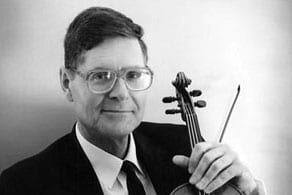 Tyrone Greive – professor of violin at the University of Wisconsin-Madison School of Music and winner in the 1997 PMC Wilk Prize for Research in Polish Music—published the article “Wieniawski’s Legacy” in the November 2012 issue of the American String Teacher. The article focuses on how 19th century violinist Henryk Wieniawski’s compositions remain valuable for today’s players and teachers in terms of building technique and developing a sense of style as well as “serve to fuse a unique mix of historically important, sometimes overlapping national traditions into a solid base for current and future playing needs.”
Tyrone Greive – professor of violin at the University of Wisconsin-Madison School of Music and winner in the 1997 PMC Wilk Prize for Research in Polish Music—published the article “Wieniawski’s Legacy” in the November 2012 issue of the American String Teacher. The article focuses on how 19th century violinist Henryk Wieniawski’s compositions remain valuable for today’s players and teachers in terms of building technique and developing a sense of style as well as “serve to fuse a unique mix of historically important, sometimes overlapping national traditions into a solid base for current and future playing needs.”
Greive’s November faculty recital and other related performances also included the Air Varies No. 2 for violin and cello by violinist-composer August Duranowski (c.1770-1834), which he performed with his cellist-wife Janet; Karol Szymanowski’s Sonata in D minor, op. 9 and Grażyna Bacewicz’s Three Dances with pianist Ted Reinke; and Anton Rubinstein-Henryk Wieniawski’s Romance in E-flat Major, op. 44, no. 1 and Zygmunt Noskowski’s Melody, op. 21, no. 1 with pianist Martha Fischer.
Greive will be soloist in Karol Szymanowski’s Violin Concerto No. 2 with the University of Wisconsin-Madison Symphony Orchestra in a free performance on Friday night, May 3, 8:00 pm in Mills Hall on the UW-Madison campus. The program will be repeated in a ticketed performance the next night (Saturday, May 4, 7:00 pm) at the River Arts Center in Prairie du Sac, WI. These concerts will be Greive’s final performances in a full-time UW-Madison role since he is officially retiring from the faculty at the end of this spring term.
[Source: press release]
Trochimczyk Folk Dance Article In Cosmopolitan Review

Online since 2008, the Cosmopolitan Review is a journal focused on Polish culture and society and intended for English-speaking readers and writers throughout the Polish diaspora. After a brief hiatus in 2012, Cosmopolitan Review is back with the publication of the Winter-Spring 2013 issue. With a fresh and lively look, new writers, lots of reviews and book news, plus great features, CR blends topics light and serious, old and new, all of them focusing – or merely touching upon – something Polish, but not necessarily from a Polish perspective. The journal remains transatlantic, transnational and transcultural, but always with a distinctive, essential Polish core.
One of the articles in this latest edition of CR is an incisive study of the Polish-American love of folk dancing and of Mazowsze—one of the world’s best dance troupes—and its not entirely benign origins. Entitled “Created by Stalin, Embraced by Emigrants? Mazowsze, Śląsk and the Polish Folk Dance Movement in America,” this article is written by the former director of the PMC, Maja Trochimczyk.
[Sources: press release, cosmopolitanreview.com]
Paderewski Scholarship Fund Appeal
The Paderewski Scholarship Fund—which annually sponsors a Polish college student to come to Georgetown University for a semester to study American style democracy—has announced its 2013 fundraising drive. Below is information taken from the Paderewski Scholarship website, describing its origins and purpose:
Although well known as a pianist and composer, Ignacy Paderewski is not sufficiently recognized as the father of modern Poland. Had it not been for Paderewski’s drafting of the 13th Point for the Versailles Treaty, there might not be a free democratic Poland today. He not only succeeded in getting the 13th Point into the Versailles Peace Treaty agenda, but also convinced Clemenceau, Lloyd George and Orlando to back the resurrection of Poland.
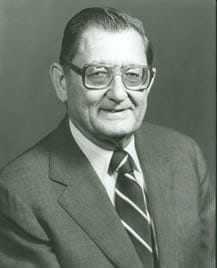 The Paderewski Scholarship was established by General Edward L. Rowny (right) in 2004. Since then, the Fund has enabled eight outstanding Polish students to attend summer courses at Georgetown University in Washington D.C. as well as intern in an organization of their choice in the nation’s capital.
The Paderewski Scholarship was established by General Edward L. Rowny (right) in 2004. Since then, the Fund has enabled eight outstanding Polish students to attend summer courses at Georgetown University in Washington D.C. as well as intern in an organization of their choice in the nation’s capital.
The Paderewski Scholarship Fund has partnered with The Fund for American Studies (TFAS) and Georgetown University in order to expose aspiring Polish leaders to American political, business and academic culture. Since 1967, TFAS has educated young people from around the world in leadership and in free-market economy.
[Sources: press release, paderewskischolarship.org]
American Paderewski Piano Competition
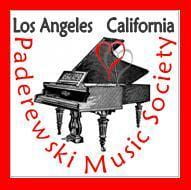 The American Paderewski Piano Competition in Los Angeles will take place from May 21 to May 26, 2013. Organized by the Paderewski Music Society in Los Angeles, the Competition is open to pianists of all nationalities born after November 1th, 1981 and before November 1th, 1997. No more than 24 pianists will be admitted to the competition, and no more than 9 pianists will be admitted to the final second stage.
The American Paderewski Piano Competition in Los Angeles will take place from May 21 to May 26, 2013. Organized by the Paderewski Music Society in Los Angeles, the Competition is open to pianists of all nationalities born after November 1th, 1981 and before November 1th, 1997. No more than 24 pianists will be admitted to the competition, and no more than 9 pianists will be admitted to the final second stage.
The competition will consist of two stages. During the First Stage, pianists’ repertoire must include one or more pieces by I. J. Paderewski, chosen from the following: Cracovienne Fantastique Op.14 No.6, Intermezzo Pollaca Op.14 No. 5, or KrakowiakOp.9 No.1, plus a free choice of repertoire up to the time limit (25-30 minutes). Repertoire for the Second Stage is free choice (50-55 minutes), but the program from the first stage must not be repeated.
Prizes include:
- Winner: 5,000.00 USD (plus concerts in the USA, Poland, and France in the 2014-2015 season)
- 2nd Place: 2,500.00 USD
- 3rd Place: 1,000.00 USD
- Other Prizes include: Best European Pianist – Barbara Wibrowski Prize ($1500 plus 2 concerts in Poland and/or France); Best Performance of Paderewski ($1000); Best Performance of Chopin (TBA); Jury’s Choice: (€1000 plus 1 week of master classes for pianists playing piano concertos with symphony orchestra at the Paderewski Piano Academy, Bydgoszcz, Poland); and Other Special Prizes to be announced at a later date.
Applications must be received by March 15th, 2013. For application form and additional instructions please visit: www.ijpaderewski.org
[Source: ijpaderewski.org]
NewAud Workshops
Recognizing that contemporary music is characterized by a quest to meet its audience in new ways, NewAud is an international learning and experience project, offering its knowledge to everyone with an interest in audience development. The goal of NewAud is to test and demonstrate the future concert forms of contemporary music in a direct cooperation between 31 music ensembles in 17 countries. For two years these 31 musical ensembles will work together across borders on the many challenges that new concert forms offers. The NewAud project is strongly supported by the Polish Composers’ Union and Polish Music Information Centre in Warsaw.
Following on the success of the first NewAud concert in November 2012, NewAud is hosting a series of workshops from March 5-22 in London. For these workshops, the 31 participating NewAud ensembles are clustering into the following smaller working groups: Youth Group (concerning youth participation and outreach), Social Group (concerning social aspects of concert-going), Ditching Groups 1 & 2 (concerning ways to break out of the traditional concert hall), and Artmix Group (concerning mixing contemporary music with other forms of art). These 5 working groups will participate in 8-hour workshops on their respective topics, featuring guest speakers, case examples, research overview, and hours of good discussions.
[Sources: polmic.pl, newaud.eu]
Thornton Faculty Perform Lutosławski In Canada
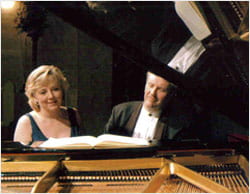 On Sunday, March 3, USC Thornton School of Music piano faculty members Bernadene Blaha and Kevin Fitz-Gerald will perform a two piano recital at the Visual and Performing Arts Newmarket Theatre in Ontario, Canada. They will perform works by Brahms, Lutosławski, Ravel, and Gershwin/Grainger
On Sunday, March 3, USC Thornton School of Music piano faculty members Bernadene Blaha and Kevin Fitz-Gerald will perform a two piano recital at the Visual and Performing Arts Newmarket Theatre in Ontario, Canada. They will perform works by Brahms, Lutosławski, Ravel, and Gershwin/Grainger
March 3, 2013 | 2:00 p.m.
Bernadene Blaha and Kevin Fitz-Gerald perform Lutosławski and more
Visual and Performing Arts Newmarket Theatre, Ontario, Canada
[Source: Thornton School of Music Newsletter]
At KF in NY
The song won’t let you forget
 “The song won’t let you forget”—a concert happening at the Kosciuszko Foundation in New York City—is a rendezvous with music that will turn back time and recreate the atmosphere of the Polish interwar cabaret. Hemar, Ordonka, Tuwim, Ziminska, Wars—these are the names that the trio of Sylwia Zawrotniak – vocal, William Beaufort – guitar, andTony Ventura – bass will bring back to the stage in their performance. Everyone can identify themselves with these sentimental yet humorous lyrics.
“The song won’t let you forget”—a concert happening at the Kosciuszko Foundation in New York City—is a rendezvous with music that will turn back time and recreate the atmosphere of the Polish interwar cabaret. Hemar, Ordonka, Tuwim, Ziminska, Wars—these are the names that the trio of Sylwia Zawrotniak – vocal, William Beaufort – guitar, andTony Ventura – bass will bring back to the stage in their performance. Everyone can identify themselves with these sentimental yet humorous lyrics.
Friday, March 1, 2013, | 7:00pm
The song won’t let you forget
Kosciuszko Foundation
15 E. 65th St., New York, NY 10065
Tickets: $15/ $10 KF Members and Students
 Recipient of the Outstanding Achievement Award from the Polish Minister of Culture, and laureate of the Award for Outstanding Polish Citizen Abroad, pianist and harpsichordist Magdalena Baczewska has been praised for her “world-class playing” (The American Record Guide). Growing up in a family of musicians, Magdalena started piano instruction at the age of five, and at twelve made her orchestra debut. As a winner of international piano competitions, she has appeared worldwide as a solo artist and in orchestral performances. Hailed as “imaginative and instructive, a player of taste, purity of tone, and clarity of line,” Magdalena appeared on major radio shows across America and Europe, including NPR, WQXR, and Voice of America. For her Kosciuszko Foundation program, she will perform works by Chopin, Szymanowski, and Kapustin.
Recipient of the Outstanding Achievement Award from the Polish Minister of Culture, and laureate of the Award for Outstanding Polish Citizen Abroad, pianist and harpsichordist Magdalena Baczewska has been praised for her “world-class playing” (The American Record Guide). Growing up in a family of musicians, Magdalena started piano instruction at the age of five, and at twelve made her orchestra debut. As a winner of international piano competitions, she has appeared worldwide as a solo artist and in orchestral performances. Hailed as “imaginative and instructive, a player of taste, purity of tone, and clarity of line,” Magdalena appeared on major radio shows across America and Europe, including NPR, WQXR, and Voice of America. For her Kosciuszko Foundation program, she will perform works by Chopin, Szymanowski, and Kapustin.
For a full biography, visit www.MagdalenaBaczewska.com.
Sunday, March 3, 2013 | 3:00pm
Magdalena Baczewska, piano
Kosciuszko Foundation
15 E. 65th St., New York, NY 10065
Tickets: $20/$15 KF Members and Students
[Source: press release, thekf.org]
At KF in D.C.
“Very interesting record, very well composed and perfectly performed. Rafal Sarnecki is a composer and musician that we will surely hear about. You can feel the New York touch. Compositions are cohesive and interesting. It is a very pleasant listen. Awesome! I highly recommend it.”–Tomasz Stańko on Sarnecki’s The Madman Rambles Again
 Jazz guitarist Rafał Sarnecki, together with pianist Glenn Zaleski, will perform his original compositions which were released on his two albums: Song from a New Place and The Madman Rambles Again. The concert will take place at the Kosciuszko Foundation in Washington D.C.
Jazz guitarist Rafał Sarnecki, together with pianist Glenn Zaleski, will perform his original compositions which were released on his two albums: Song from a New Place and The Madman Rambles Again. The concert will take place at the Kosciuszko Foundation in Washington D.C.
Originally from Warsaw, Poland, Sarnecki is a composer currently living in New York. He started to gain recognition after his success at the “International Jazz Guitar Competition – Guitar City 2002” in Warsaw where he received the 1st award. When he moved to the U.S. in 2005 he was already recognized in Poland as one of the most creative and fresh sounding musicians of the younger generation. In 2005 he received a scholarship at the prestigious Jazz and Contemporary Music program at the New School University in Manhattan. In 2008 he finished his undergraduate degree from The New School with Academic Honors. In 2010 he received his MA degree from the Aaron Copland School of Music also in New York.
For a full biography, visit rafalsarnecki.com
Friday, March 8, 2013 | 7:00 pm
Rafał Sarnecki, guitar and Glenn Zaleski, piano
Kosciuszko Foundation
2025 O street NW, Washington, DC 20036
Tickets: $20/$15 KF Members and Students
[Source: thekf.org]
Polish Organ Music in D.C.
 The Embassy of the Republic of Poland and Washington National Cathedral will host an organ recital by Marek Kudlicki. Program: Toccata Prima – Georg Muffat (1653-1704), Dance Suite – from the Organ Tablature by Jan of Lublin (c. 1540), Prelude and Fugue in E flat major BWV 552 – Johann Sebastian Bach (1685-1750), Improvisations on the Polish Church Hymn “Holy God” Op. 38 – Mieczysław Surzyński (1866-1924), Rota – Passacaglia on a Theme of Feliks Nowowiejski (1985) – Bronisław K. Przybylski (b. 1941).
The Embassy of the Republic of Poland and Washington National Cathedral will host an organ recital by Marek Kudlicki. Program: Toccata Prima – Georg Muffat (1653-1704), Dance Suite – from the Organ Tablature by Jan of Lublin (c. 1540), Prelude and Fugue in E flat major BWV 552 – Johann Sebastian Bach (1685-1750), Improvisations on the Polish Church Hymn “Holy God” Op. 38 – Mieczysław Surzyński (1866-1924), Rota – Passacaglia on a Theme of Feliks Nowowiejski (1985) – Bronisław K. Przybylski (b. 1941).
Born in Tomaszów Lubelski, Poland, Marek Kudlicki studied organ and conducting in Kraków and Vienna. Kudlicki won the First Prize (and the Special Prize of the Polish Ministry of Culture and Art) in the Organ Competition in Poland in 1973. He has given concerts in almost all of the European countries and many times in the USA and Canada (46 North American tours), as well as in Australia, New Zealand, South Africa, Colombia, Argentina, Mexico, Hong Kong, Japan, Malaysia, Singapore and Taiwan. His annual coast to coast North American tours are greeted with enthusiasm. Marek Kudlicki regularly promotes Polish organ music in his programs. He routinely includes works of Polish composers from all periods in his recitals and his recordings.
Sunday, March 17, 2013 | 5:15 PM
Marek Kudlicki – organ recital
Washington National Cathedral
3101 Wisconsin Ave. NW, Washington, DC 20016-5098
$10 suggested donation
[Sources: press release, nationalcathedral.org, Image: commons.wikimedia.org]
Chopin FDN Concerts in March
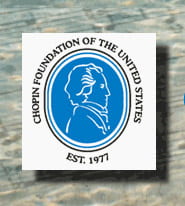 On March 9 and 10, the Chopin Foundation of the United States’ Chopin for All series continues with a concert by Christina McGann, violin & Igor Lovchinsky, piano. Pianist Igor Lovchinsky, a finalist of the 2005 National Chopin Piano Competition of the USA, is also the first prize winner of the Eastman International Piano Competition and the National Chopin Piano Competition of the Kosciuszko Foundation. Violinist Christina McGann enjoys a diverse performing career as a soloist, chamber, and orchestral musician. She has performed concertos with the National Symphony Orchestra, the Richardson Symphony, Musica Bella Orchestra in New York, the Moldovan Chamber Orchestra, the National Chamber Orchestra in Washington D.C., and most recently the St. Petersburg Academic Symphony in Russia.
On March 9 and 10, the Chopin Foundation of the United States’ Chopin for All series continues with a concert by Christina McGann, violin & Igor Lovchinsky, piano. Pianist Igor Lovchinsky, a finalist of the 2005 National Chopin Piano Competition of the USA, is also the first prize winner of the Eastman International Piano Competition and the National Chopin Piano Competition of the Kosciuszko Foundation. Violinist Christina McGann enjoys a diverse performing career as a soloist, chamber, and orchestral musician. She has performed concertos with the National Symphony Orchestra, the Richardson Symphony, Musica Bella Orchestra in New York, the Moldovan Chamber Orchestra, the National Chamber Orchestra in Washington D.C., and most recently the St. Petersburg Academic Symphony in Russia.
Saturday, March 9, 2013 | 3:00 PM
Christina McGann, violin & Igor Lovchinsky, piano
Broward County Main Library, 100 S. Andrews Ave, Ft. Lauderdale
ADMISSION IS FREE! No Tickets Required
Sunday, March 10, 2013 | 3:00 PM
Christina McGann, violin & Igor Lovchinsky, piano
Granada Presbyterian Church, 950 University Drive, Coral Gables
ADMISSION IS FREE! No Tickets Required
Also in March, the next installment in the Membership Concert Series of the Chopin Foundation of the United States will feature pianist Mei-Ting Sun, winner of the 2005 National Chopin Competition. These salon-style concerts are followed by a wine reception and post-concert dinner with wine.
Sunday, March 24, 2013 | 4:00 p.m.
Membership Concert Series: Pianist Mei-Ting Sun
La Gorce Country Club, 5685 Alton Road, Miami Beach
Concert reservations: here
More information is available at chopin.org.
[Source: press release]
Poles at Curtis Inst. of Music
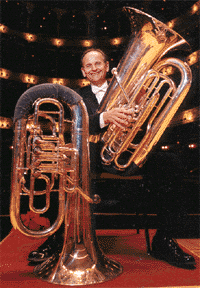 Paul Krzywicki (right) will be delivering a lecture entitled “The founding and development of the Curtis Institute of Music: Its faculty and alumni of Polish descent” at the Curtis Institute of Music on Saturday, April 6. The lecture will be supported by a Powerpoint presentation of photos and followed by a short program featuring three current Curtis students: Piotr Filochowski – violin, Tomasz Kowalczyk – percussion and Lee Jarzembak – tuba, accompanied by Susan Nowicki – piano. Their all-Polish program will include works by Chopin, Penderecki, Ptaszyńska and Wieniawski.
Paul Krzywicki (right) will be delivering a lecture entitled “The founding and development of the Curtis Institute of Music: Its faculty and alumni of Polish descent” at the Curtis Institute of Music on Saturday, April 6. The lecture will be supported by a Powerpoint presentation of photos and followed by a short program featuring three current Curtis students: Piotr Filochowski – violin, Tomasz Kowalczyk – percussion and Lee Jarzembak – tuba, accompanied by Susan Nowicki – piano. Their all-Polish program will include works by Chopin, Penderecki, Ptaszyńska and Wieniawski.
Paul Krzywicki is a member of the tuba faculty at the Curtis Institute of Music since 1972 was a member of the Philadelphia Orchestra from 1972 until his retirement in 2005. For a full bio, visit www.curtis.edu.
Saturday, April 6 | 3:00 PM
Field Concert Hall – Curtis Institute of Music
1726 Locust Street, Philadelphia, PA 19103
[Source: press release]
Awards
Musica Sacra – Winners
 On February 15, 2013 in Częstochowa, Poland, the Jury of the 9th International Musica Sacra Competition for Composers— Marian Borkowski (Poland), Eriks Ešenvalds (Latvia), Stephen Layton (Great Britain), Jan Łukaszewski (Poland) and Richard Mailänder (Germany)—convened to determine the winners of the 2013 Competition. 19 compositions had been submitted to the Competition from 6 countries: South Korea, Poland, United States, Ukraine, UK and Italy. All works complied with the terms and conditions of the Competition. The Jury declared the following winners:
On February 15, 2013 in Częstochowa, Poland, the Jury of the 9th International Musica Sacra Competition for Composers— Marian Borkowski (Poland), Eriks Ešenvalds (Latvia), Stephen Layton (Great Britain), Jan Łukaszewski (Poland) and Richard Mailänder (Germany)—convened to determine the winners of the 2013 Competition. 19 compositions had been submitted to the Competition from 6 countries: South Korea, Poland, United States, Ukraine, UK and Italy. All works complied with the terms and conditions of the Competition. The Jury declared the following winners:
- 1st prize: Artur Słotwiński (Poland) – Seven Last Words Of Christ
- 2nd prize: Douglas Pew (USA) – Kyrie
- 3rd prize: Łukasz Farcinkiewicz (Poland) – Pater noster
[Sources: press release, competition.waw.pl]
Finalists In The Lutosławski Cello Competition
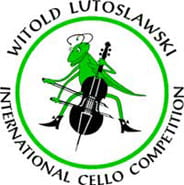 On February 28, the final stage of the 2013 Lutosławski Cello Competition was held in Warsaw. One of the few competitions in the world for young cellists, the competition is open to musicians under the age of 24 years. This year’s finalists were:
On February 28, the final stage of the 2013 Lutosławski Cello Competition was held in Warsaw. One of the few competitions in the world for young cellists, the competition is open to musicians under the age of 24 years. This year’s finalists were:
- I place: Chiara ENDERLE (Switzerland)
- II place ex aequo: Dominik PŁOCIŃSKI (Poland) & Víctor GARCÍA GARCÍA (Spain)
- III place: Edward Alexander KING (New Zealand)
Special Prizes for the best performance of:
- Grave by Lutosławski: Dominik PŁOCIŃSKI
- Sacher Variation by Lutosławski: Edward Alexander KING
- Obligato by Weronika Ratusińska-Zamuszko: Chiara ENDERLE
Award of the European Union of Music Competitions for Youth (EMCY): Chiara ENDERLE
Prizes for accompanists were also awarded to: Agnieszka KOZŁO (Poland), Dominik ZABŁOCKI (Poland), Magdalena BOJANOWICZ (Poland) and Mikołaj PAŁOSZ (Poland).
In the final stage of the Competition, laureates joined the Warsaw National Philharmonic under the baton of young conductor Rafał Janiak to perform the cello concertos of Lutosławski (Płociński), Schumann (Enderle) and Haydn (King and García García). In addition to all of Lutosławski’s works for cello, in earlier stages of the competition participants also performed works by Krzysztof Penderecki, Fryderyk Chopin, Jerzy Bauer, Paweł Szymański, Weronika Ratusińska-Zamuszko, Benjamin Britten, Alfred Schnittke, and Ludwig van Beethoven.
For more information and gallery of laureate photos, please visit www.lutoslawski-cello.art.pl.
[Sources: polmic.pl, lutoslawski-cello.art.pl, lutoslawski.culture.pl]
Honorary Title for J. Drzewiecki
 On February 11, at the closing gala of the VIII International Piano Forum “Bieszczady bez granic” [Bieszczady (Mountains) without borders] at the Lviv Philharmonic, His Magnificence Rector Igor Pylatyuk of the M.Lysenki National Academy of Music in Lviv bestowed the title of Professoris Honoris Causa upon Polish pianist and pedagogue Jarosław Drzewiecki. Drzewiecki was honored in the presence of the Consul General of Poland in Lviv, and the Senate and Rectors of the University.
On February 11, at the closing gala of the VIII International Piano Forum “Bieszczady bez granic” [Bieszczady (Mountains) without borders] at the Lviv Philharmonic, His Magnificence Rector Igor Pylatyuk of the M.Lysenki National Academy of Music in Lviv bestowed the title of Professoris Honoris Causa upon Polish pianist and pedagogue Jarosław Drzewiecki. Drzewiecki was honored in the presence of the Consul General of Poland in Lviv, and the Senate and Rectors of the University.
Although the Lviv Academy boasts a nearly 130-year tradition, dating back to its first rector, Xaver Mozart, the University confers honorary titles very rarely—last year, an honorable mention was given to violist Yuri Bashmet.
[Sources: polmic.pl, interpiano.pl, culture.pl]
Anderszewski Nominated To Gramophone Hall Of Fame
Polish-Hungarian pianist Piotr Anderszewski (b. April 4, 1969) has been nominated to Gramphone Magazine’s Hall of Fame. Launched in 2012, the Gramophone Hall of Fame honors artists, producers, and record executives who, through their talent, innovation and dedication, have changed the shape of, and forever enriched, the history of classical music recording. If elected, Anderszewski would join such other great pianists as Martha ARGERICH, Claudio ARRAU, Daniel BARENBOIM, Alfred BRENDEL, Glenn GOULD, Vladimir HOROWITZ, LANG LANG, Murray PERAHIA, Maurizio POLLINI, Sviatoslav RICHTER and Arthur RUBINSTEIN.
Having welcomed 50 names last year, in Gramophone’s 90th year, the magazine has opened online voting to help choose a further select group of entrants for 2013. To vote, select up to ten nominees from this list, spreading your 10 votes across the different categories as you wish.
[Source: gramophone.co.uk]
Discography
ARS Nova Recording Of Cyprian Bazylik
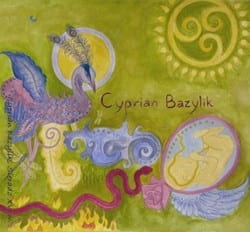 Bazylik Cyprian: Complete Works
Bazylik Cyprian: Complete Works
Nabożna piosnka, words: Andrzej Trzecieski, jr.; Panie Boże wszechmocny, words: Jakub Lubelczyk; Pieśń o niebezpieczeństwie żywota, words: Jakub Lubelczyk; W Tobie, Panie, nadzieję mam, words: Stanisław Kleryka?; Pieśń z Ewanjelijej wyjęta, words: Jakub Lubelczyk *; Wszytcy są błogosławieni, words: Bernard Wojewódka; Dobrotliwość Pańska, words: Jakub Lubelczyk; Oratio Dominica, words: Andrzej Trzecieski, jr.; Pieśń nowa, w której jest dziękowanie, words: Anon.; Pieśń nowa krześcijańska, words: Jakub Lubelczyk; Z głębokości grzechów moich, words: Anon.; Zaniechaj towarzystwa z ludźmi złościwemi, words: Jakub Lubelczyk; Pieśń ranna, gdy słońce wschodzi, words: Szymon Zacius *; Pożegnanie krześcijańskie na każdy dzień, words: Szymon Zacius *; Benedicto Mense, words: Andrzej Trzecieski *
Subtilior Ensemble, Piotr Zawistowski – cond.: Piotr Olech – contertenor, Maciej Gocman – tenor, Szczepan Kosior – tenor, Piotr Zawistowski – bass; Chór Cantilena, Sieradz, S. Alina Kulik – cond., Ars Nova: Agnieszka Obst-Chwała – fiddle, Joanna Nogal – fiddle, Marcin Zalewski – lute , viola da gamba (soprano), Paweł Zalewski – viola da gamba (bass), Piotr Zalewski – viola da gamba (tenor), Piotr Wawreniuk – trombone, Krzysztof Owczynik – flutes, cornamuse, Jacek Urbaniak – flutes, cornamuse, pomorty, artistic director
Travers Web Site
* PREMIERE RECORDINGS
The early music ensemble Ars Nova has previously recorded the complete works of Mikołaj of Radom, Piotr of Grudziądz, and Sebastian Klonowica, documenting the earliest important monuments of Polish music. Crowning 30 years of creative activity, Ars Nova’s most recent edition is a recording of the songs of Cyprian Bazylik. It was recorded in the town of Sieradz, where Cyprian Bazylik was born.
Cyprian Bazylik’s work is considered to be very important in the history of Polish music. His 4-voice songs are of beauty and quality equal to that of mainstream Western Renaissance music. Bazylik worked as a musician at the court of King Zygmunt II Augustus and belonged to the elite of Polish culture.
Amongst the 15 recorded songs are 4 recording premieres. This CD has been nominated for a 2013 Fryderyk Award.
[Source: polmic.pl]
Premiere Recordings On Acte Préalable
 Władysław Żeleński: Complete Works for Violin and Piano
Władysław Żeleński: Complete Works for Violin and Piano
Sonata for violin and piano op. 30 in F major; Romance op. 16 no 1; Chant elegique op. 16 no 2; Romance op. 29 no 1; Danse Fantastique op. 29 no 2; Barceuse op. 32; Intermezzo from the opera “Goplana”; Fragment of ballet music form the opera “Konrad Wallenrod”; Lyrischer Walzer op. 15; Romance op. 40
Essential Duo: Ciężarek Gustaw, violin; Lim Soyeon, piano. Booklet: Maryla Renat (Polish, English)
Acte Préalable AP0239
 Ludomir Różycki: Chamber works with piano
Ludomir Różycki: Chamber works with piano
Piano Quintet Op. 35; Rhapsody Op. 33; Cello Sonata
Op. 10
Godziszewski Jerzy, piano; .Wilanów String Quartet: Gadzina Tadeusz, Ist violin; Łosakiewicz Paweł, IInd violin; Duź Ryszard, viola; Wasiółka Marian, cello. Booklet: Maryla Renat (Polish, English)
Acte Préalable AP0253
Notes from the Acte Préalable website:
Ludomir Różycki has been renowned and admired as a composer of theatre music and symphonic poems, and as a founding member of the Młoda Polska (Young Poland) movement. His chamber and solo works, which perfectly complement his pieces for the stage and symphonies, have so far lain in the shadow of the latter, which is in itself a widespread phenomenon of concert reality: only a small portion of a composer’s oeuvre is taken into account, giving an incomplete picture of his overall achievement and promoting prefabricated notions. Our primary interest on this record centres on Różycki’s early Młoda Polska phase. This initial stage, lasting until 1916, bears a testimony of a beginner composer responding to the current modernist trends and influences of Western European music. The output of many an ambitious composer living at the turn of the twentieth century was marked by the synthesis of the late Romantic style with impressionistic colours on the one hand and symptoms of expressionism on the other hand. Różycki’s youthful works were characterised by the same progressive attitude.
 Aleksander Tansman : Pour les enfants
Aleksander Tansman : Pour les enfants
Quatre recueils de difficulté progressive; Piano Miniatures
Tyszecka Elżbieta, piano. Booklet: Elżbieta Tyszecka (Polish, English)
Acte Préalable AP0255
Notes from the Acte Préalable website:
Works for the children and teenagers hold a very important place within the output of Aleksander Tansman. The composer began writing them in 1933 and finished this unusual cycle in 1972 with easy pieces for guitar. Aleksander Tansman specified the purpose of writing these pieces in the following words: “I wanted to bridge the abysmal gap, for a very young pianist, between the school’s methodical exercises and the real repertoire of the great masters. At least partially. What I had in mind was to overcome the stylistic, technical and aesthetic difficulties, (…) to construct a bridge between scales and exercises on the one hand and the whole repertory from Bach and Haendel until the present times on the other”. The works written by the Polish composer were eagerly played by students of European and American schools of music. Among several hundred compositions for young performers that Aleksander Tansman wrote piano works are predominant. Having said that, it needs to be mentioned that the composer also took great care to create a platform for young musicians to crack the hard nut of accompaniment and chamber ensemble playing. In the latter output he wrote pieces for violin and piano, two violins, cello and piano, as well as trios intended for violin, cello and piano, and piano compositions for four hands.
[Source: acteprealable.com]
CD Review/Personality Profile
By Gary Fitelberg
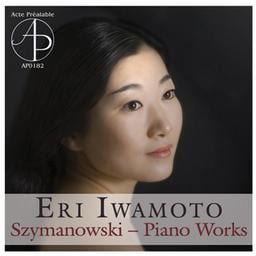 Eri Iwamoto: Szymanowski – Piano Works
Eri Iwamoto: Szymanowski – Piano Works
Karol Szymanowski (1882-1937): 9 Preludes Op. 1; Variations in B flat minor Op. 3; Etude in B flat minor Op. 4 No 3; Metopes Op. 29; Mazurkas Op. 50 No. 1-4
Eri Iwamoto, piano
Acte Prelable AP 182
Eri Iwamoto shows special sensitivity in her performances of Szymanowski’s piano works. She is perhaps one of the leading proponents of piano music of Polish composers from a foreign nation other than Poland.
Eri Iwamoto was born in Nara, Japan. She started playing piano at age 3. Syzmanowski started playing piano at age 7. She graduated from Soai University in Osaka, Fryderyk Chopin Academy of Music in Warsaw (now the Chopin University of Music), Hochshule der Künste in Bern, and Conservatoire de Musique in Geneve. In 2007, she received a Soloist Diploma from the Academy of Music in Basel. She next went on to further her studies at the Conservatoria di Musica in Verona.
During 2001, Iwamoto was given a Grand Prix at the Ninth Milosz Magin International Piano Competition in Paris and in 2005 a prize for the best performance of a work by Karol Szymanowski at the Sixth Karol Szymanowski International Competition in Łódź.
Eri Iwamoto gives concert performances internationally in Italy, France, Switzerland, Portugal, Poland and Japan. She has appeared at the Yehudi Menuhin Festival in Gstaad, Switzerland, Viana do Castelo Music Festival in Portugal, Schubert Festival in Italy and Lato z Chopinem [Summer with Chopin] Festival in Busko-Zdrój, Poland.
She had the opportunity to work with the following pedagogues: Barbara Hesse-Bukowska, Maciej Piotrkowski, Virginio Pavarana, Fillipo Gamba, Tomasz Herbut, Sumiko Tsujimoto, and Kumito Hata. Iwamoto has also taken part in master classes organized by Piotr Anderszewski, Andrezj Jasinski and Fou T’song.
When asked about her love of Polish piano music especially that of Symanowski she describes in detail her first and lasting impression of this composer:
When I arrived at Warsaw from the hot summer sun of Japan, it was cold and windy despite the summer. My aim was to participate in the master course led by Professor Barbara Hesse-Bukowska at the Fryderyk Chopin Academy of Music. I owe my interest in Karol Szymanowski to her. At that time, I associated the music by Karol Szymanowski exclusively with the impressionism of his Masques and Mythes. When I first encountered the Preludes, Mazurkas, and Variations in B flat minor, I was stunned by the enormous differences among those works. It was hard to believe they were penned by the same author. I was especially seduced by the desperate longing found in Prelude Op. 1, No. 8. I could play it on and on as though I were entranced. It soon became my favorite piece. The power with which the composer speaks deep into the heart of the listener and performerer fascinated me to such a point that I elected to devote myself to his music. Professor Barbara Hesse Bukowska offered me to study in her class after I completed my education in Japan. This is how my adventure with the music of Karol Szymanowski started.
Artur Rubenstein, the great Polish pianist would surely agree with Iwamoto’s assessment and deep admiration for Szymanowski. From the very outset, he developed a close connection with the piano music of Szymanowski. Clearly, when he himself first discovered and encountered the Op. 1 Preludes by a then virtually unknown Polish composer, he also felt the magic of the music and himself was entranced by its qualities. Rubenstein recalls in his memoirs “It is impossible to describe our amazement after playing the first few bars of the Prelude. That music was written by a master! We hastily ran through all the manuscripts while our enthusiasm and excitement rose as we realized that we were discovering a great Polish composer.”
Iwamoto immersed herself in the study of not only Szymanowski’s musical language but the Polish language to fully and truly comprehend his essence, which has clearly found its way to this archival sound recording. It is compelling and fascinating. She adds boastfully, “I would be quite happy if it helped further dissemination of the great composer’s music.”
Szymanowski displays a rare gift at the heart and foundation of his compositions. Eri Iwamoto brings her clear and demonstrative understanding of this gift to life through her concert performances and this CD.
Gary Fitelberg is a musicologist and music critic specializing in the Young Poland composers Grzegorz Fitelberg, Mieczysław Karłowicz, Ludomir Różycki, Apolinary Szeluto, and Karol Szymanowski, as well as Polish-Jewish music and musicians.
[Source: geocities.jp, acteprealable.com]
Festivals
2013 Beethoven Festival
 The 17th Ludwig van Beethoven Easter Festival will be held on March 17-29, 2013. This year, the Festival will celebrate the 100th birthday of Witold Lutosławski, the 200th birthday of Verdi and Wagner, the 80th birthday of the late Henryk Mikołaj Górecki, and the 80th birthday of Krzysztof Penderecki. Works by these celebrated composers to be performed include: Górecki’s Symphony No. 2 “Copernican” Op. 31, Lutosławski’s Concerto for Cello and Orchestra, and Penderecki’s Violin Concerto No. 2 “Metamorphosen,” as well as Verdi’s Requiem, and Act 2 of Wagner’s Tristan and Isolde.
The 17th Ludwig van Beethoven Easter Festival will be held on March 17-29, 2013. This year, the Festival will celebrate the 100th birthday of Witold Lutosławski, the 200th birthday of Verdi and Wagner, the 80th birthday of the late Henryk Mikołaj Górecki, and the 80th birthday of Krzysztof Penderecki. Works by these celebrated composers to be performed include: Górecki’s Symphony No. 2 “Copernican” Op. 31, Lutosławski’s Concerto for Cello and Orchestra, and Penderecki’s Violin Concerto No. 2 “Metamorphosen,” as well as Verdi’s Requiem, and Act 2 of Wagner’s Tristan and Isolde.
The 2013 Festival will feature over 20 concerts in Warsaw and in several other Polish cities. It will welcome internationally renowned chamber ensembles that seldom visit Poland, including the Belcea Quartet, the Artis Quartet, and the Tokyo String Quartet, which will present works by Haydn, Schubert, Verdi and Bartók in addition to compositions by the festival’s patron.
For a full program of concerts, please visit: www.beethoven.org.pl.
[Source: beethoven.org.pl]
Performances
Polish Shofar Trio in L.A.
By Gary Fitelberg
 Los Angeles’ Little Tokyo neighborhood was the place to listen to great Polish jazz musicians who demonstrate a passion for Jewish music when, on February 27, the Blue Whale jazz club and art gallery played host to the Shofar Trio.
Los Angeles’ Little Tokyo neighborhood was the place to listen to great Polish jazz musicians who demonstrate a passion for Jewish music when, on February 27, the Blue Whale jazz club and art gallery played host to the Shofar Trio.
Formed in 2006, the Shofar Trio (right) —guitarist Raphael Rogiński, saxophonist and bass clarinet player Mikołaj Trzaska and drummer Macio Moretti—joins traditional Jewish music with contemporary avant-jazz and rock. The Poland-based band released its debut album in 2007, featuring works based on the first compendium of Hassidic melodies from the Ukraine, Poland and Moldova compiled by early 20th-century Soviet musicologist Moshe Beregovsky (1892-1961). Over the past five years, the group has performed throughout Europe. The concert will feature the trio’s innovative interpretations of nigunim, or religious songs (meant to induce a state of religious ecstasy), more dancelike freylakhs, and Jewish liturgical music.
A shofar (Hebrew: שׁוֹפָר) is a horn, traditionally that of a ram, used for Jewish religious purposes. Shofar-blowing is incorporated in synagogue services on Rosh Hashanah and Yom Kippur. Shofar come in a variety of sizes. Hear the blasts…tekiyah…shevarim…teruah.
Shofar’s founder Raphael Roginski was born in Frankfurt am Main, Germany and began playing electric guitar at the age of 13. He received both jazz and classical musical training and supplemented his education with studies of musicology and ethnomusicology. Since his earliest creative pursuits his main focus has been on jazz-influenced improvisation and folk music. As a composer and performer, he feels a powerful connection to Jewish culture and strives to include it in his work with his two bands, SHOFAR and CUKUNFT. Roginski has collaborated with many established musicians in Poland and abroad, including Noel Akchote, Frederic Blondy, Joe Giardullo, Axel Dorner, Thomas Lehn, Andrew Sharpley, John Edwards, John Tilbury, Brigit Ulher, Yale Strom, Macio Moretti, Patryk Zakrocki, Tomasz Gwincinski, Daniel Pigonski, Konstanty Usenko, Vadim O. Pavluk, Ryszard Latecki. He was a guest artist on such albums as Djazzpora, Sztetlach, Broniewski, and Meritum.
Mikołaj Trzaska was born in Gdańsk, Poland. He is saxophonist, bass clarinetist, composer, and one of the founders of “yass” – a combination of new wave, free jazz, modern rock, and poetry that spawned a socio-artistic movement in the 1980s and 90s, opposing what the participants saw as the rigidity of the Polish jazz environment. Together with Tymon Tymański and a group of other musicians free from any fixed doctrine, they changed the image of Polish jazz music. Trzaska was the co-founder of the most important yass group – “Miłość” [Love] and the similarly creative “Łoskot” [Clatter]. Although the impetus of yass faded away many years ago, Trzaska became the leader of the national improvised-music scene and recorded a few concentrated and quiet albums with the Oleś brothers. He also accompanied poets such as Świetlicki and Andrukhovych, and created musical-literary projects with Andrzej Stasiuk. Today he is the leader of the international quartet INNER EAR, danish trio Volumen and a member of, among others, Resonance of Ken Vandermark, Magic – Joe McPhee, and the Shofar trio. Above all he sees himself in the mode of radical contemporary free jazz. He travels around the world cooperating with personalities of world improvisation among such as: Peter Brötzmann, Joe McPhee, Ken Vandermark, Peter Friis Nielsen, Clementine Gasser, Pete Ole Jorgensen, Michael Zerang, Franz Houtzinger, Jay Rosen, Domik Duval, and Mark Sanders. He has recorded about thirty albums.
Macio Moretti is a performer, composer, producer, vocalist and multi-instrumentalist. He started his musical career as bass guitarist with SLAGE IMAGE/KROLOWIE ZYCIA; now he plays drums as a member of STARZY SINGERS and BAABA. His broad spectrum of musical interests covers such diverse areas as grind/punk, twisted country-and-western, improv, psychedelic and pseudojazz. He is a cofounder of the independent music labels Lado ABC and Zgnile Meiso Rekords. In 2010, Moretti received the “Passport” Award from influential Polish news weekly, Polityka. He has a successful second career in graphic design, working for publications such as Przekrój, one of the country’s oldest and most respected magazines.
The Shofar Trio tour began February 21st in New York City at Lincoln Center followed by appearances and concerts at the Heaven Gallery and Hungary Brain in Chicago, 2013 Chutzpah! Festival in Vancouver, Royal Room in Seattle, Blue Whale in Los Angeles, 28th Jewish Musical Festival in Berkeley and concluding concert at the Blue Monk in Portland on March 3rd.
The energy exuded during the concert was electrifying and energetic—the Shofar trio not only lit up Litttle Tokyo but all L.A. and may have extended all the way to Poland. Absolutely amazing and awesome.
Gary Fitelberg is a musicologist and music critic specializing in the Young Poland composers Grzegorz Fitelberg, Mieczysław Karłowicz, Ludomir Różycki, Apolinary Szeluto, and Karol Szymanowski, as well as Polish-Jewish music and musicians.
[Sources: polishculture-nyc.org, jewishmusicfestival.org]
Anniversaries
Born This Month
- 1 March 1810 – Fryderyk Chopin, virtuoso pianist, composer
- 2 March 1927 – Witold Szalonek, composer (d. 2001)
- 3 March 1922 – Kazimierz Serocki, composer, co-founder of the Warsaw Autumn Festival
- 6 March 1785 – Karol Kurpinski, composer, father of national opera
- 6 March 1835 – Ludwik Grossman, composer, pianist, and piano merchant (d. 1915)
- 7 March 1911 – Stefan Kisielewski, composer, essayist, writer
- 10 March 1937 – Bernadetta Matuszczak, composer
- 14 March 1913 – Witold Rudzinski, composer
- 17 March 1901 – Piotr Perkowski, composer
- 17 March 1925 – Tadeusz Prejzner, composer, jazz pianist(d. 2010)
- 18 March 1961 – Hanna Kulenty, composer
- 21 March 1936 – Marek Stachowski, composer
- 23 March 1933 – Andrzej Trzaskowski, composer, jazz pianist and conductor
- 23 March 1888 – Lidia Kmitowa, violinist and teacher (d. 1980)
- 27 March 1927 – Joachim Olkusnik, composer
- 28 March 1954 – Pawel Szymanski, composer
Died This Month
- 1 March 2004 – Janina Garscia, composer of music for children and teachers
- 2 March 1887 – Wilhelm Troschel, singer and son of piano maker
- 2 March 2010 – Wanda Tomczykowska, founder Polish Arts and Culture Foundation [PACF] of San Francisco (b. 29 August 1921)
- 3 March 2011 – Bohdan Pociej, critic, musicologist, author
- 4 March 1939 – Józef Sliwinski, pianist, composer (b. 1862)
- 4 March 1925 – Maurycy (Moritz) Moszkowski, composer and pianist (b. 1854)
- 4 March 1895 – Stanislaw Niedzielski, singer (baritone), choral conductor.
- 14 March 1954 – Ludomir Rogowski (b. 3 Oct 1881)
- 15 March 1883 – Karol Studzinski, violinist (b. 1828)
- 15 March 1948 – Konrad Neuger, conductor, active in the U.S. since 1931 (b. 1890)
- 16 March, 2010 – Tadeusz Prejzner, composer, jazz pianist (b.1925)
- 19 March 1876 – Józef Stefani, composer, conductor, violinist, son of Jan (b. 1800)
- 21 March 1973 – Antoni Szalowski, composer
- 22 March 1893 – Adam Herman Hermanowski, cellist, child prodigy and virtuoso (b. 1836)
- 29 March 1937 – Karol Szymanowski, composer, pianist (b. 1882)
- 29 March 1959 – Zdzislaw Szulc, curator of music instruments museum in Poznan
- 31 March 1880 – Henryk Wieniawski, composer, virtuoso violinist (b. 1835)
- 31 March 1946 – Aleksandra Stromfeld-Klamzynska-Szuminska, soprano (b. 1859)
